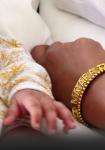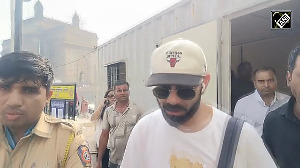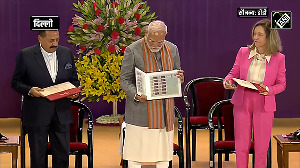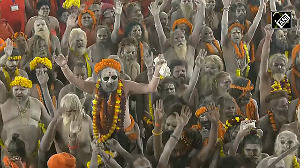

When Dr K R Balakrishnan, head of cardiac surgery, Ramachandra Medical College, his wife Dr Kalpana, anaesthetist at the Cancer Institute, and their twin sons, Gowtham, a medical student, and Arun, an engineering student, decided to go to the Andaman and Nicobar Islands, all they wanted was a quiet Christmas holiday.
As they had decided on the holiday at the last moment, all they could get was a passage by ship.
It was for the good, they thought, as it was for the first time that they were going to be on a ship.
They boarded early on December 22 and reached Port Blair some 48 hours later.
After taking a swim at the beach, and a trip to Cellular Jail, the family went on a four-hour journey by ship (INS Ramanujam) to Havelock Island to meet a doctor friend.
They checked into a hotel on the beach at Dolphin Bay.
They had planned to take a ship back to Port Blair the next day. But someone suggested a visit to Elephant Beach, and they couldn't resist. So they stayed back with the intention of going to the beach on December 26.
The 26th dawned, as beautiful a day as any other in the island. They jumped on to a fishing boat with a small diesel engine and started their exciting journey of 45 minutes to Elephant Beach.
There were six of them -- the family, their doctor friend and a fisherman.
After about 15 TO 20 minutes, a giant wave rocked the boat.
"We didn't find anything unusual. What could we expect except waves in the sea? But the fisherman, who had 20 TO 30 years of experience, got worried. He immediately said it looked like a bhookamp (earthquake)," Dr Balakrishnan told rediff.com
The fisherman was right.
The word bhookamp alarmed Dr Kalpana and she wanted to go back, but her husband and their sons could not wait to get to the beach.
They waited for ten minutes and when they did not meet any more giant waves, they decided to go ahead.
The fisherman also did not object.
Shortly thereafter, they were on Elephant Beach. But they were in for a huge disappointment. The water there, which was said to be crystal clear, was muddy and no coral was visible.
There was no option but to turn back.
"It must have been eight by then. The return journey was uneventful till we reached close to the jetty," Dr Balakrishnan said.
The fisherman tried to reach the jetty, but the waves seemed to be pushing the boat back.
For the next 15 minutes, he continued to push on to the jetty, less than 2 km away.
The worried fisherman whispered to Dr Balakrishnan's friend that he was running out of fuel.
Dr Kalpana, who overheard the conversation, began to get worried.
"I told my kids that there was not enough fuel to reach the jetty, but they teased me saying what he said was that he had just enough fuel to reach the jetty. The kids felt I was reading too much into the conversation," Dr Kalpana remarked.
Dr Balakrishnan didn't think there was a reason to worry. "I thought why should we worry when we could see the jetty from where we were."
It was then that the fisherman said in a whisper that it was the first time in his 30 years of experience that such a thing was happening.
Instead of trying to push through the waves unsuccessfully and wasting the fuel, the fisherman decided to tie the boat to two fishing buoys close by.
Then he asked all of them to get on to the buoys.
"We got onto a buoy just half as wide as a chair; just two logs of wood. You could not put your foot into the water underneath as that was where fish were kept. We sat one behind the other," Dr Balakrishnan said.
And then they saw A huge wave rising and moving landwards. They could see the bottom of the sea, and the coral that was not visible at Elephant Beach, as the wave moved in.
The wave then swept back. As the water receded, they saw the roots of the trees on the seashore. Another wave moved in then, and in the next minute, the trees got submerged, and disappeared from sight.
The lighthouse, which stood high and mighty at one moment, came under the rushing water the next.
"The water level was going up and down. We knew something unusual was happening but I thought it was only a local disturbance. My sons who had just finished school said they were tsunami waves! The word tsunami did not make any sense to me," Dr Balakrishnan said.
As the waves danced, the buoy on which they were sitting started spinning. It went round and round, slowly first, and then gained momentum. All of them held on to the pieces of wood as the buoy first spun clockwise and then anticlockwise.
"By then my wife got really scared and she kept on saying we were going to die, we had not made a will etc. I told her if all four of us were going to die, it would make no difference if we had left a will," Dr Balakrishnan joked.
"Yes, I got really scared. The thought that came to my mind at that time was about a will. I thought if our children were to survive, and we were to die, we had not made a will," Dr Kalpana said.
Dr Balakrishnan said he was more annoyed than worried. "I was annoyed because I felt we were just wasting our time sitting on a buoy for hours. Under the hot sun, we were feeling tired and thirsty."
Minutes turned to hours and still the sea was acting like an angry monster. Then they saw the ship from Port Blair that they had earlier planned to take. All of them waved but there was no response.
By then, even the shore, which was clearly visible till then, became blurred and that worried the fisherman even more.
They had been clinging to the buoy for three-and-a-half hours.
Finally, it was past noon when the fisherman gathered enough courage to untie the boat from the buoy and take it back to the jetty.
The voyage that started at 6.45 am was about to end.
But once again, the waves pushed the boat back.
The boatman decided to anchor the boat just 50 metres away from the jetty.
Many people were waiting for them on the shore. Word had spread about a missing family.
The men on the shore threw them a rope and pulled them ashore.
It was only when they reached the shore that they came to know about the havoc the waves had wrought.
The hotel they were staying in was inundated and ravaged.
They survived because they were out in the sea and not on land.
All the tourists spent the night at a nearby school.
There was no connection with the outside world as all phones had stopped working. The ground shook with tremors the entire night.
The next day, ships came to take all the people back to Port Blair.
"There was a stampede and people nearly killed each other trying to board the ship," Dr Balakrishnan said.
The airport at Port Blair was like a refugee camp; there was no water or electricity.
Still, the family was not aware of the situation they were in.
Only when they reached Chennai on December 28 did they realise the enormity of what they had gone through.
"When we read the papers, we got frightened. Actually, we should have been frightened and screaming when we were on the buoy. But one thing we understood; the line between life and death is very thin."
That comment was from a cardiac surgeon.
"Maybe I was not scared of death because I see a lot of death every day."
Photo: Sreeram Selvaraj | Headline Image: Rahil Shaikh






 © 2025
© 2025